Deloitte: Analysing Organisational Behaviour and Team Effectiveness
VerifiedAdded on 2023/06/07
|14
|5012
|421
Report
AI Summary
This report provides an analysis of organisational behaviour within Deloitte, a multinational services network. It explores how an organisation's culture, politics, and power influence individual and team behaviour and performance. The report evaluates content and process theories of motivation and motivational techniques, examining their role in achieving organisational goals. It also differentiates between effective and ineffective teams, applying organisational behaviour concepts and philosophies within the context of Deloitte's business situation. The analysis covers various aspects of power, including legitimate, reward, referent, informational, and expert power, as well as the impact of politics on performance and workplace ambience. Furthermore, it discusses the influence of organisational culture, including power and task cultures, on employee behaviour and productivity. The report also delves into Maslow's Need Hierarchy Theory and Herzberg's Two-Factor Theory to understand employee motivation within the organisation.
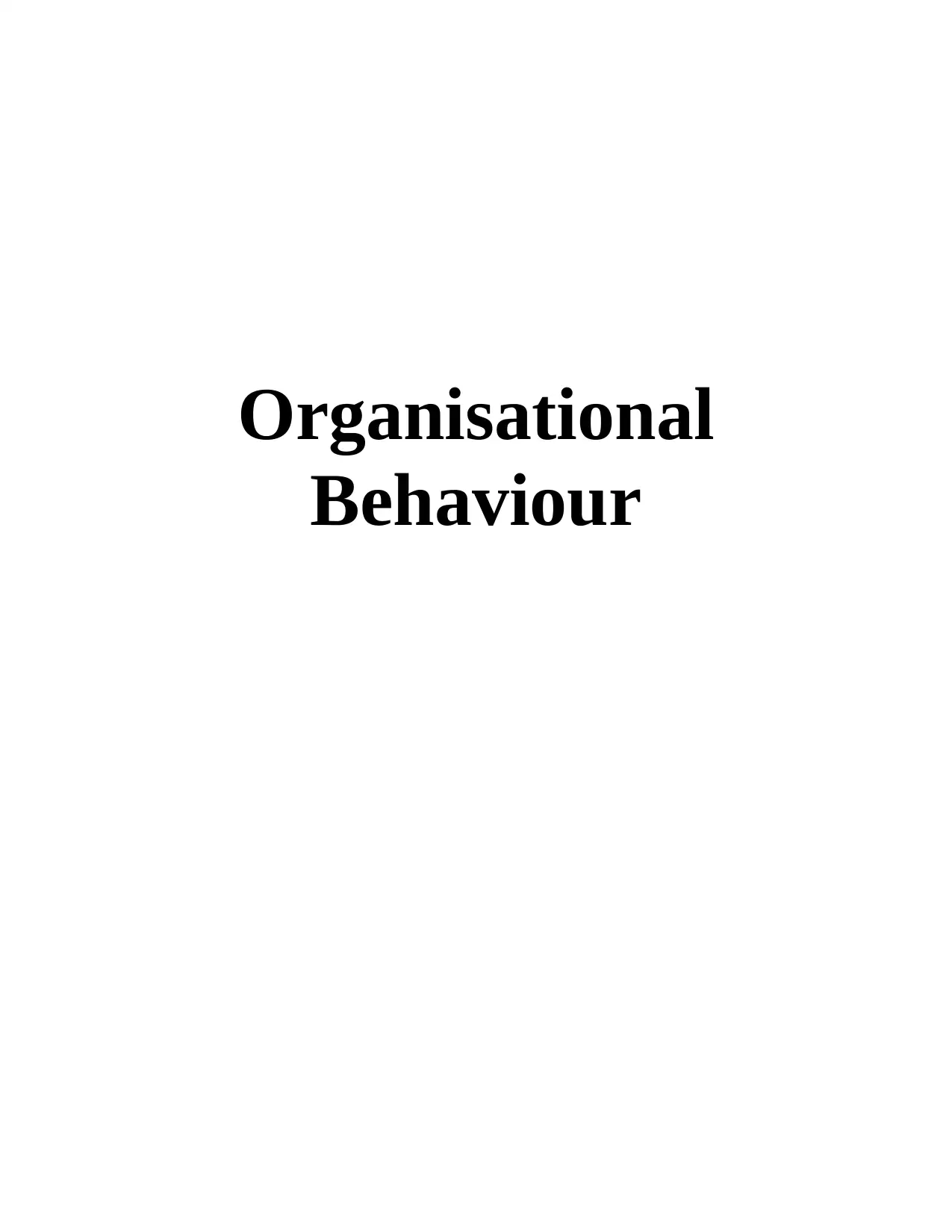
Organisational
Behaviour
Behaviour
Paraphrase This Document
Need a fresh take? Get an instant paraphrase of this document with our AI Paraphraser
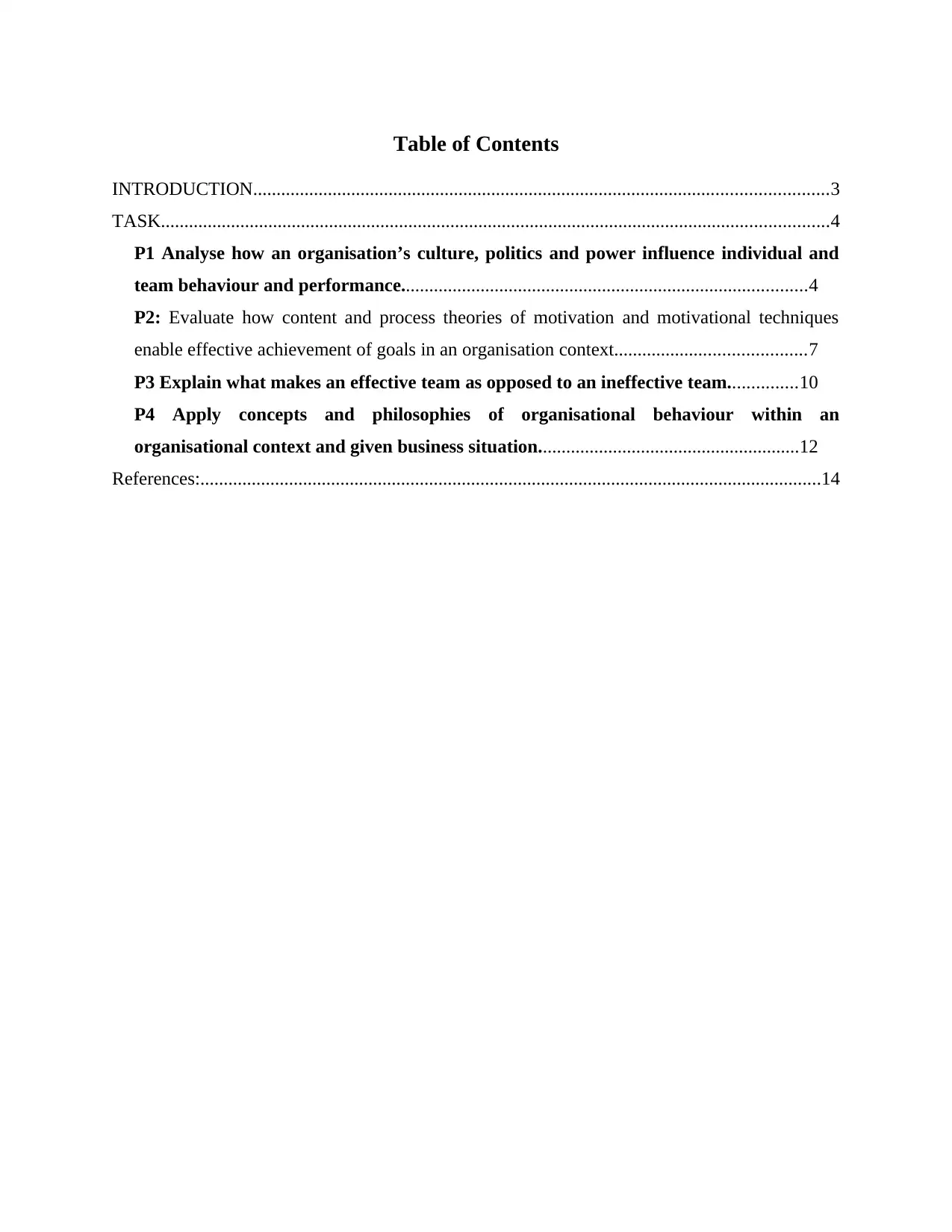
Table of Contents
INTRODUCTION...........................................................................................................................3
TASK...............................................................................................................................................4
P1 Analyse how an organisation’s culture, politics and power influence individual and
team behaviour and performance.......................................................................................4
P2: Evaluate how content and process theories of motivation and motivational techniques
enable effective achievement of goals in an organisation context.........................................7
P3 Explain what makes an effective team as opposed to an ineffective team...............10
P4 Apply concepts and philosophies of organisational behaviour within an
organisational context and given business situation........................................................12
References:.....................................................................................................................................14
INTRODUCTION...........................................................................................................................3
TASK...............................................................................................................................................4
P1 Analyse how an organisation’s culture, politics and power influence individual and
team behaviour and performance.......................................................................................4
P2: Evaluate how content and process theories of motivation and motivational techniques
enable effective achievement of goals in an organisation context.........................................7
P3 Explain what makes an effective team as opposed to an ineffective team...............10
P4 Apply concepts and philosophies of organisational behaviour within an
organisational context and given business situation........................................................12
References:.....................................................................................................................................14
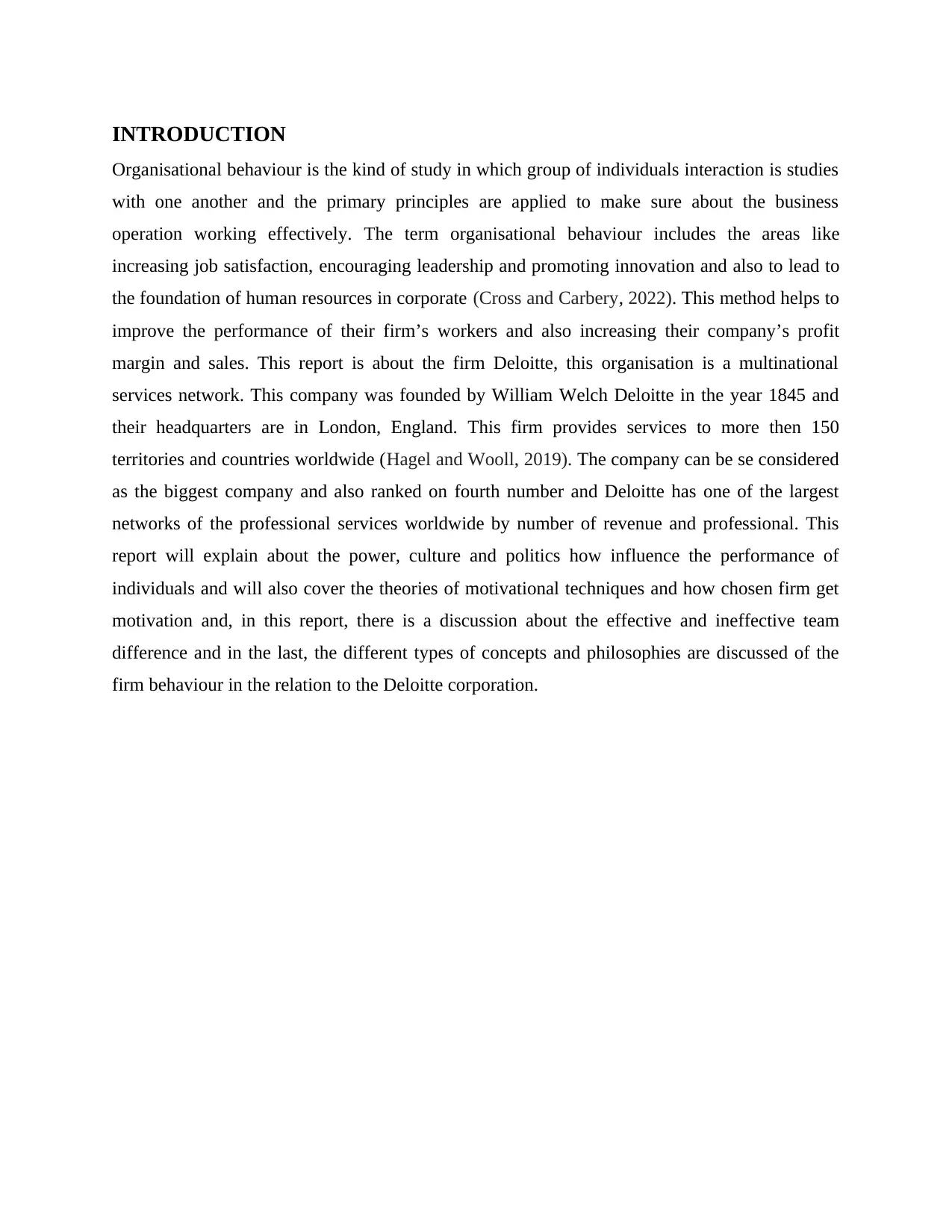
INTRODUCTION
Organisational behaviour is the kind of study in which group of individuals interaction is studies
with one another and the primary principles are applied to make sure about the business
operation working effectively. The term organisational behaviour includes the areas like
increasing job satisfaction, encouraging leadership and promoting innovation and also to lead to
the foundation of human resources in corporate (Cross and Carbery, 2022). This method helps to
improve the performance of their firm’s workers and also increasing their company’s profit
margin and sales. This report is about the firm Deloitte, this organisation is a multinational
services network. This company was founded by William Welch Deloitte in the year 1845 and
their headquarters are in London, England. This firm provides services to more then 150
territories and countries worldwide (Hagel and Wooll, 2019). The company can be se considered
as the biggest company and also ranked on fourth number and Deloitte has one of the largest
networks of the professional services worldwide by number of revenue and professional. This
report will explain about the power, culture and politics how influence the performance of
individuals and will also cover the theories of motivational techniques and how chosen firm get
motivation and, in this report, there is a discussion about the effective and ineffective team
difference and in the last, the different types of concepts and philosophies are discussed of the
firm behaviour in the relation to the Deloitte corporation.
Organisational behaviour is the kind of study in which group of individuals interaction is studies
with one another and the primary principles are applied to make sure about the business
operation working effectively. The term organisational behaviour includes the areas like
increasing job satisfaction, encouraging leadership and promoting innovation and also to lead to
the foundation of human resources in corporate (Cross and Carbery, 2022). This method helps to
improve the performance of their firm’s workers and also increasing their company’s profit
margin and sales. This report is about the firm Deloitte, this organisation is a multinational
services network. This company was founded by William Welch Deloitte in the year 1845 and
their headquarters are in London, England. This firm provides services to more then 150
territories and countries worldwide (Hagel and Wooll, 2019). The company can be se considered
as the biggest company and also ranked on fourth number and Deloitte has one of the largest
networks of the professional services worldwide by number of revenue and professional. This
report will explain about the power, culture and politics how influence the performance of
individuals and will also cover the theories of motivational techniques and how chosen firm get
motivation and, in this report, there is a discussion about the effective and ineffective team
difference and in the last, the different types of concepts and philosophies are discussed of the
firm behaviour in the relation to the Deloitte corporation.
⊘ This is a preview!⊘
Do you want full access?
Subscribe today to unlock all pages.

Trusted by 1+ million students worldwide
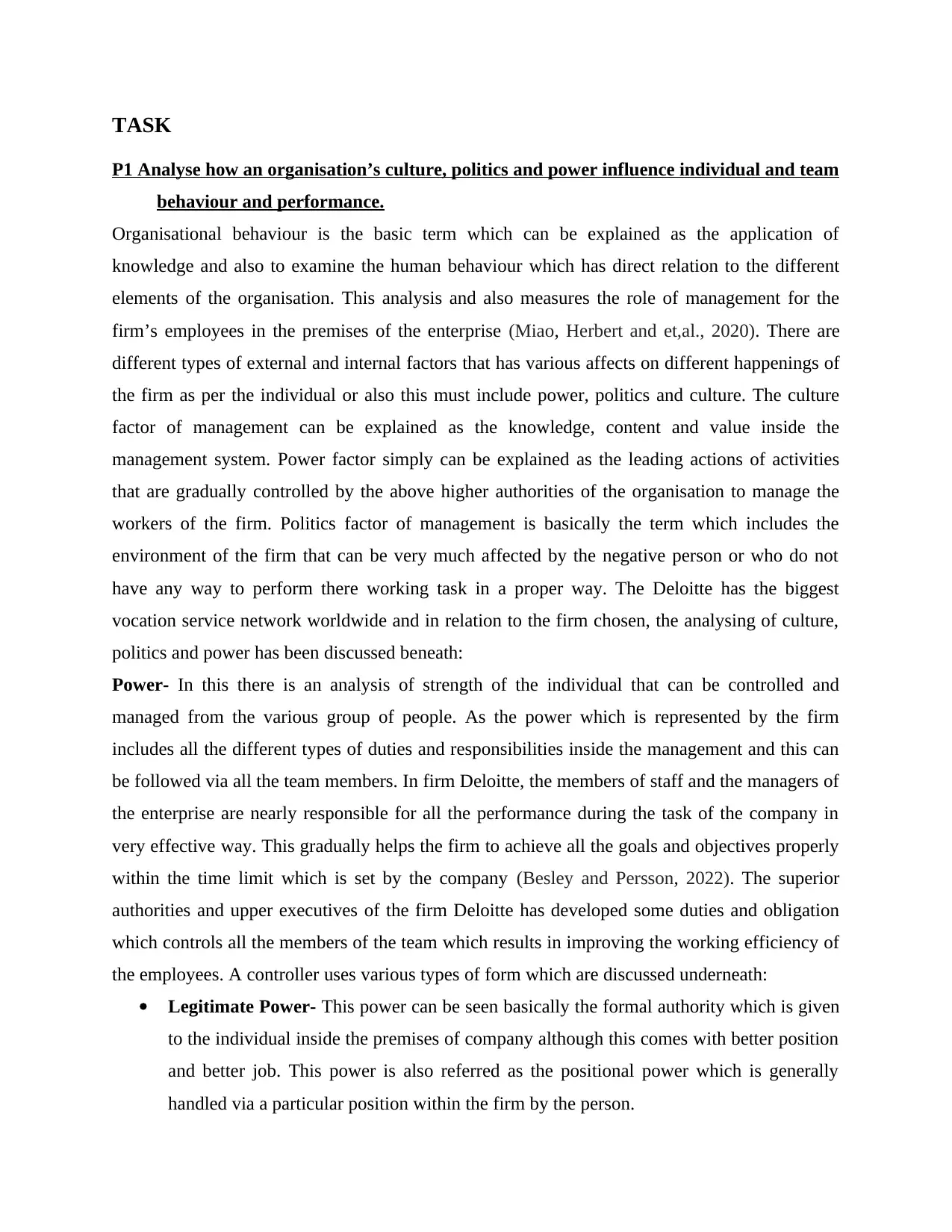
TASK
P1 Analyse how an organisation’s culture, politics and power influence individual and team
behaviour and performance.
Organisational behaviour is the basic term which can be explained as the application of
knowledge and also to examine the human behaviour which has direct relation to the different
elements of the organisation. This analysis and also measures the role of management for the
firm’s employees in the premises of the enterprise (Miao, Herbert and et,al., 2020). There are
different types of external and internal factors that has various affects on different happenings of
the firm as per the individual or also this must include power, politics and culture. The culture
factor of management can be explained as the knowledge, content and value inside the
management system. Power factor simply can be explained as the leading actions of activities
that are gradually controlled by the above higher authorities of the organisation to manage the
workers of the firm. Politics factor of management is basically the term which includes the
environment of the firm that can be very much affected by the negative person or who do not
have any way to perform there working task in a proper way. The Deloitte has the biggest
vocation service network worldwide and in relation to the firm chosen, the analysing of culture,
politics and power has been discussed beneath:
Power- In this there is an analysis of strength of the individual that can be controlled and
managed from the various group of people. As the power which is represented by the firm
includes all the different types of duties and responsibilities inside the management and this can
be followed via all the team members. In firm Deloitte, the members of staff and the managers of
the enterprise are nearly responsible for all the performance during the task of the company in
very effective way. This gradually helps the firm to achieve all the goals and objectives properly
within the time limit which is set by the company (Besley and Persson, 2022). The superior
authorities and upper executives of the firm Deloitte has developed some duties and obligation
which controls all the members of the team which results in improving the working efficiency of
the employees. A controller uses various types of form which are discussed underneath:
Legitimate Power- This power can be seen basically the formal authority which is given
to the individual inside the premises of company although this comes with better position
and better job. This power is also referred as the positional power which is generally
handled via a particular position within the firm by the person.
P1 Analyse how an organisation’s culture, politics and power influence individual and team
behaviour and performance.
Organisational behaviour is the basic term which can be explained as the application of
knowledge and also to examine the human behaviour which has direct relation to the different
elements of the organisation. This analysis and also measures the role of management for the
firm’s employees in the premises of the enterprise (Miao, Herbert and et,al., 2020). There are
different types of external and internal factors that has various affects on different happenings of
the firm as per the individual or also this must include power, politics and culture. The culture
factor of management can be explained as the knowledge, content and value inside the
management system. Power factor simply can be explained as the leading actions of activities
that are gradually controlled by the above higher authorities of the organisation to manage the
workers of the firm. Politics factor of management is basically the term which includes the
environment of the firm that can be very much affected by the negative person or who do not
have any way to perform there working task in a proper way. The Deloitte has the biggest
vocation service network worldwide and in relation to the firm chosen, the analysing of culture,
politics and power has been discussed beneath:
Power- In this there is an analysis of strength of the individual that can be controlled and
managed from the various group of people. As the power which is represented by the firm
includes all the different types of duties and responsibilities inside the management and this can
be followed via all the team members. In firm Deloitte, the members of staff and the managers of
the enterprise are nearly responsible for all the performance during the task of the company in
very effective way. This gradually helps the firm to achieve all the goals and objectives properly
within the time limit which is set by the company (Besley and Persson, 2022). The superior
authorities and upper executives of the firm Deloitte has developed some duties and obligation
which controls all the members of the team which results in improving the working efficiency of
the employees. A controller uses various types of form which are discussed underneath:
Legitimate Power- This power can be seen basically the formal authority which is given
to the individual inside the premises of company although this comes with better position
and better job. This power is also referred as the positional power which is generally
handled via a particular position within the firm by the person.
Paraphrase This Document
Need a fresh take? Get an instant paraphrase of this document with our AI Paraphraser
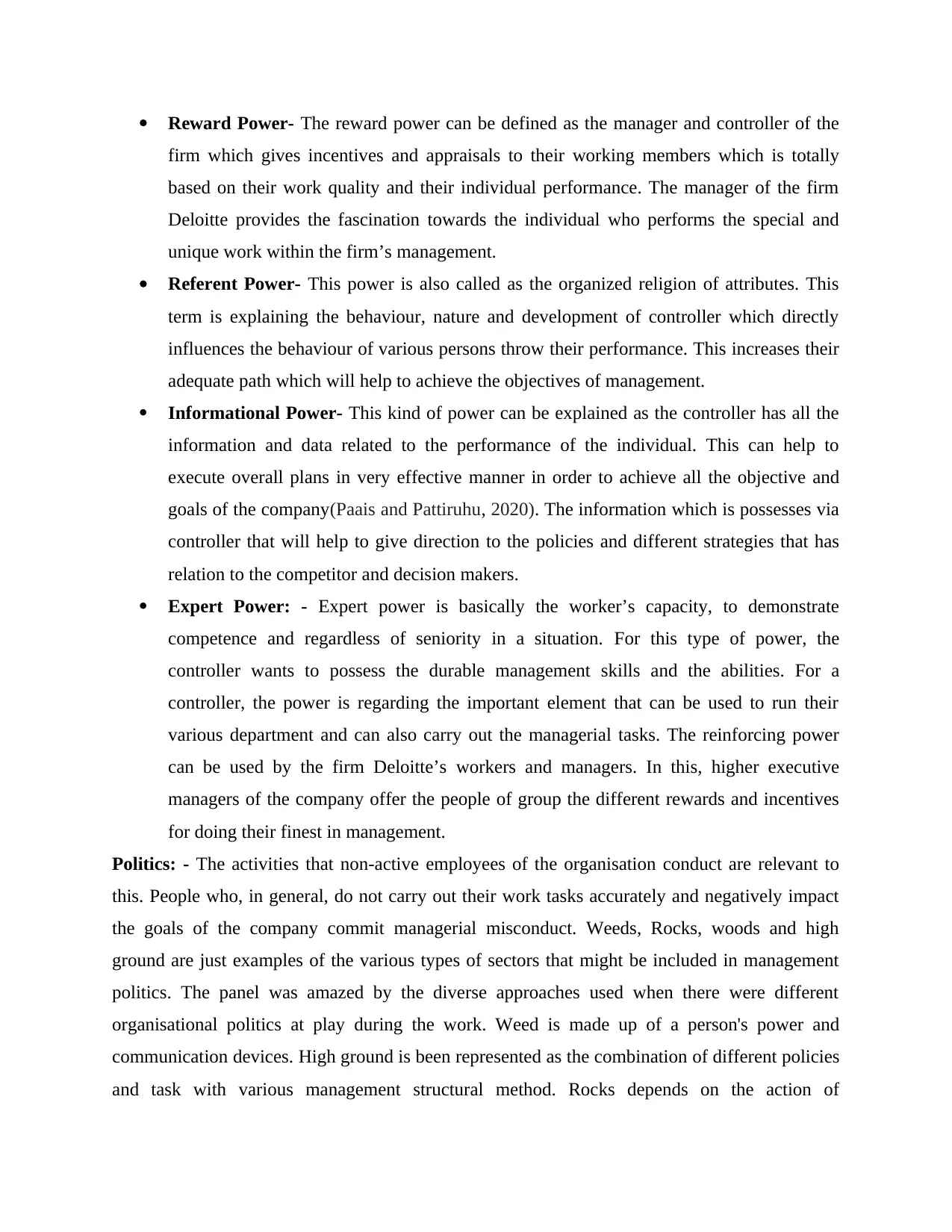
Reward Power- The reward power can be defined as the manager and controller of the
firm which gives incentives and appraisals to their working members which is totally
based on their work quality and their individual performance. The manager of the firm
Deloitte provides the fascination towards the individual who performs the special and
unique work within the firm’s management.
Referent Power- This power is also called as the organized religion of attributes. This
term is explaining the behaviour, nature and development of controller which directly
influences the behaviour of various persons throw their performance. This increases their
adequate path which will help to achieve the objectives of management.
Informational Power- This kind of power can be explained as the controller has all the
information and data related to the performance of the individual. This can help to
execute overall plans in very effective manner in order to achieve all the objective and
goals of the company(Paais and Pattiruhu, 2020). The information which is possesses via
controller that will help to give direction to the policies and different strategies that has
relation to the competitor and decision makers.
Expert Power: - Expert power is basically the worker’s capacity, to demonstrate
competence and regardless of seniority in a situation. For this type of power, the
controller wants to possess the durable management skills and the abilities. For a
controller, the power is regarding the important element that can be used to run their
various department and can also carry out the managerial tasks. The reinforcing power
can be used by the firm Deloitte’s workers and managers. In this, higher executive
managers of the company offer the people of group the different rewards and incentives
for doing their finest in management.
Politics: - The activities that non-active employees of the organisation conduct are relevant to
this. People who, in general, do not carry out their work tasks accurately and negatively impact
the goals of the company commit managerial misconduct. Weeds, Rocks, woods and high
ground are just examples of the various types of sectors that might be included in management
politics. The panel was amazed by the diverse approaches used when there were different
organisational politics at play during the work. Weed is made up of a person's power and
communication devices. High ground is been represented as the combination of different policies
and task with various management structural method. Rocks depends on the action of
firm which gives incentives and appraisals to their working members which is totally
based on their work quality and their individual performance. The manager of the firm
Deloitte provides the fascination towards the individual who performs the special and
unique work within the firm’s management.
Referent Power- This power is also called as the organized religion of attributes. This
term is explaining the behaviour, nature and development of controller which directly
influences the behaviour of various persons throw their performance. This increases their
adequate path which will help to achieve the objectives of management.
Informational Power- This kind of power can be explained as the controller has all the
information and data related to the performance of the individual. This can help to
execute overall plans in very effective manner in order to achieve all the objective and
goals of the company(Paais and Pattiruhu, 2020). The information which is possesses via
controller that will help to give direction to the policies and different strategies that has
relation to the competitor and decision makers.
Expert Power: - Expert power is basically the worker’s capacity, to demonstrate
competence and regardless of seniority in a situation. For this type of power, the
controller wants to possess the durable management skills and the abilities. For a
controller, the power is regarding the important element that can be used to run their
various department and can also carry out the managerial tasks. The reinforcing power
can be used by the firm Deloitte’s workers and managers. In this, higher executive
managers of the company offer the people of group the different rewards and incentives
for doing their finest in management.
Politics: - The activities that non-active employees of the organisation conduct are relevant to
this. People who, in general, do not carry out their work tasks accurately and negatively impact
the goals of the company commit managerial misconduct. Weeds, Rocks, woods and high
ground are just examples of the various types of sectors that might be included in management
politics. The panel was amazed by the diverse approaches used when there were different
organisational politics at play during the work. Weed is made up of a person's power and
communication devices. High ground is been represented as the combination of different policies
and task with various management structural method. Rocks depends on the action of
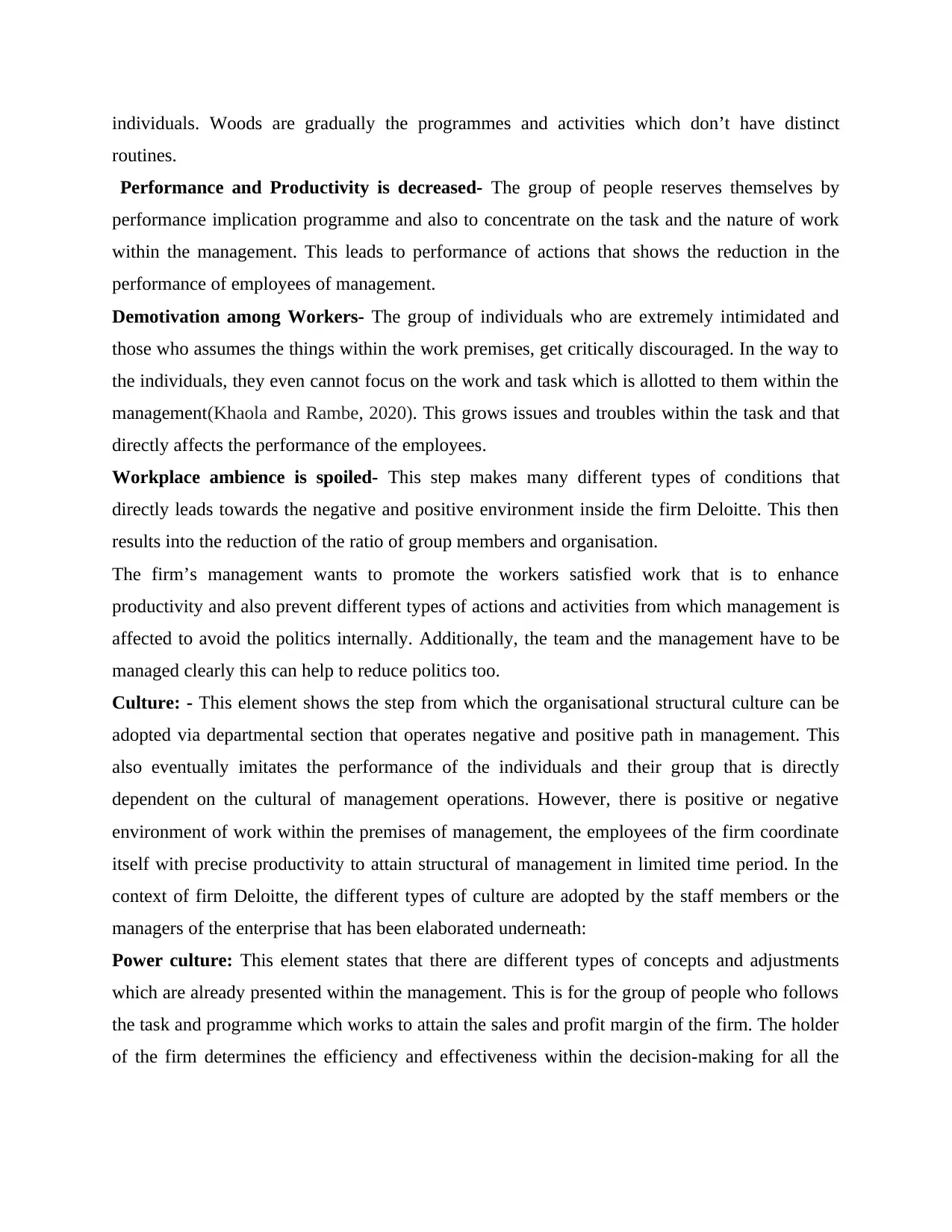
individuals. Woods are gradually the programmes and activities which don’t have distinct
routines.
Performance and Productivity is decreased- The group of people reserves themselves by
performance implication programme and also to concentrate on the task and the nature of work
within the management. This leads to performance of actions that shows the reduction in the
performance of employees of management.
Demotivation among Workers- The group of individuals who are extremely intimidated and
those who assumes the things within the work premises, get critically discouraged. In the way to
the individuals, they even cannot focus on the work and task which is allotted to them within the
management(Khaola and Rambe, 2020). This grows issues and troubles within the task and that
directly affects the performance of the employees.
Workplace ambience is spoiled- This step makes many different types of conditions that
directly leads towards the negative and positive environment inside the firm Deloitte. This then
results into the reduction of the ratio of group members and organisation.
The firm’s management wants to promote the workers satisfied work that is to enhance
productivity and also prevent different types of actions and activities from which management is
affected to avoid the politics internally. Additionally, the team and the management have to be
managed clearly this can help to reduce politics too.
Culture: - This element shows the step from which the organisational structural culture can be
adopted via departmental section that operates negative and positive path in management. This
also eventually imitates the performance of the individuals and their group that is directly
dependent on the cultural of management operations. However, there is positive or negative
environment of work within the premises of management, the employees of the firm coordinate
itself with precise productivity to attain structural of management in limited time period. In the
context of firm Deloitte, the different types of culture are adopted by the staff members or the
managers of the enterprise that has been elaborated underneath:
Power culture: This element states that there are different types of concepts and adjustments
which are already presented within the management. This is for the group of people who follows
the task and programme which works to attain the sales and profit margin of the firm. The holder
of the firm determines the efficiency and effectiveness within the decision-making for all the
routines.
Performance and Productivity is decreased- The group of people reserves themselves by
performance implication programme and also to concentrate on the task and the nature of work
within the management. This leads to performance of actions that shows the reduction in the
performance of employees of management.
Demotivation among Workers- The group of individuals who are extremely intimidated and
those who assumes the things within the work premises, get critically discouraged. In the way to
the individuals, they even cannot focus on the work and task which is allotted to them within the
management(Khaola and Rambe, 2020). This grows issues and troubles within the task and that
directly affects the performance of the employees.
Workplace ambience is spoiled- This step makes many different types of conditions that
directly leads towards the negative and positive environment inside the firm Deloitte. This then
results into the reduction of the ratio of group members and organisation.
The firm’s management wants to promote the workers satisfied work that is to enhance
productivity and also prevent different types of actions and activities from which management is
affected to avoid the politics internally. Additionally, the team and the management have to be
managed clearly this can help to reduce politics too.
Culture: - This element shows the step from which the organisational structural culture can be
adopted via departmental section that operates negative and positive path in management. This
also eventually imitates the performance of the individuals and their group that is directly
dependent on the cultural of management operations. However, there is positive or negative
environment of work within the premises of management, the employees of the firm coordinate
itself with precise productivity to attain structural of management in limited time period. In the
context of firm Deloitte, the different types of culture are adopted by the staff members or the
managers of the enterprise that has been elaborated underneath:
Power culture: This element states that there are different types of concepts and adjustments
which are already presented within the management. This is for the group of people who follows
the task and programme which works to attain the sales and profit margin of the firm. The holder
of the firm determines the efficiency and effectiveness within the decision-making for all the
⊘ This is a preview!⊘
Do you want full access?
Subscribe today to unlock all pages.

Trusted by 1+ million students worldwide
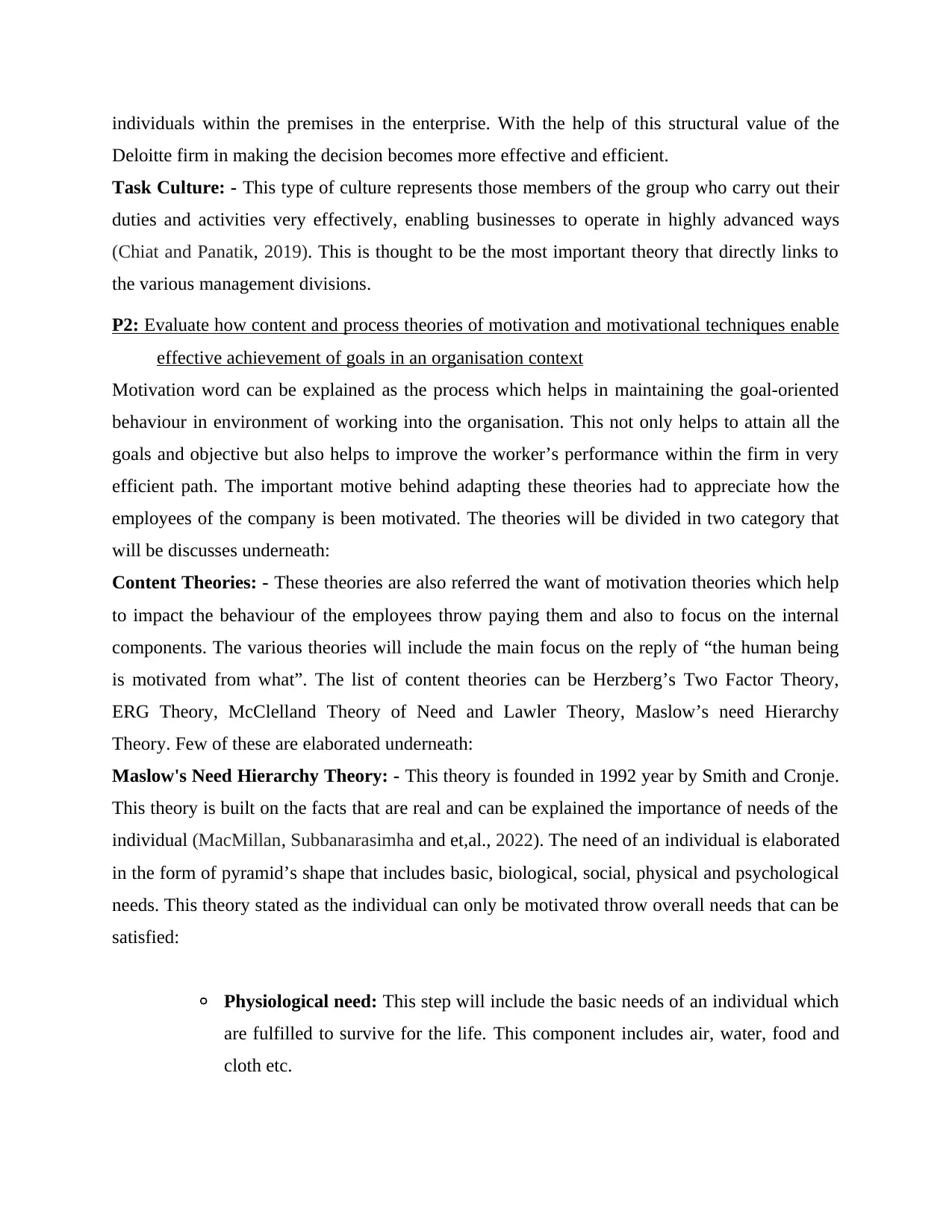
individuals within the premises in the enterprise. With the help of this structural value of the
Deloitte firm in making the decision becomes more effective and efficient.
Task Culture: - This type of culture represents those members of the group who carry out their
duties and activities very effectively, enabling businesses to operate in highly advanced ways
(Chiat and Panatik, 2019). This is thought to be the most important theory that directly links to
the various management divisions.
P2: Evaluate how content and process theories of motivation and motivational techniques enable
effective achievement of goals in an organisation context
Motivation word can be explained as the process which helps in maintaining the goal-oriented
behaviour in environment of working into the organisation. This not only helps to attain all the
goals and objective but also helps to improve the worker’s performance within the firm in very
efficient path. The important motive behind adapting these theories had to appreciate how the
employees of the company is been motivated. The theories will be divided in two category that
will be discusses underneath:
Content Theories: - These theories are also referred the want of motivation theories which help
to impact the behaviour of the employees throw paying them and also to focus on the internal
components. The various theories will include the main focus on the reply of “the human being
is motivated from what”. The list of content theories can be Herzberg’s Two Factor Theory,
ERG Theory, McClelland Theory of Need and Lawler Theory, Maslow’s need Hierarchy
Theory. Few of these are elaborated underneath:
Maslow's Need Hierarchy Theory: - This theory is founded in 1992 year by Smith and Cronje.
This theory is built on the facts that are real and can be explained the importance of needs of the
individual (MacMillan, Subbanarasimha and et,al., 2022). The need of an individual is elaborated
in the form of pyramid’s shape that includes basic, biological, social, physical and psychological
needs. This theory stated as the individual can only be motivated throw overall needs that can be
satisfied:
◦ Physiological need: This step will include the basic needs of an individual which
are fulfilled to survive for the life. This component includes air, water, food and
cloth etc.
Deloitte firm in making the decision becomes more effective and efficient.
Task Culture: - This type of culture represents those members of the group who carry out their
duties and activities very effectively, enabling businesses to operate in highly advanced ways
(Chiat and Panatik, 2019). This is thought to be the most important theory that directly links to
the various management divisions.
P2: Evaluate how content and process theories of motivation and motivational techniques enable
effective achievement of goals in an organisation context
Motivation word can be explained as the process which helps in maintaining the goal-oriented
behaviour in environment of working into the organisation. This not only helps to attain all the
goals and objective but also helps to improve the worker’s performance within the firm in very
efficient path. The important motive behind adapting these theories had to appreciate how the
employees of the company is been motivated. The theories will be divided in two category that
will be discusses underneath:
Content Theories: - These theories are also referred the want of motivation theories which help
to impact the behaviour of the employees throw paying them and also to focus on the internal
components. The various theories will include the main focus on the reply of “the human being
is motivated from what”. The list of content theories can be Herzberg’s Two Factor Theory,
ERG Theory, McClelland Theory of Need and Lawler Theory, Maslow’s need Hierarchy
Theory. Few of these are elaborated underneath:
Maslow's Need Hierarchy Theory: - This theory is founded in 1992 year by Smith and Cronje.
This theory is built on the facts that are real and can be explained the importance of needs of the
individual (MacMillan, Subbanarasimha and et,al., 2022). The need of an individual is elaborated
in the form of pyramid’s shape that includes basic, biological, social, physical and psychological
needs. This theory stated as the individual can only be motivated throw overall needs that can be
satisfied:
◦ Physiological need: This step will include the basic needs of an individual which
are fulfilled to survive for the life. This component includes air, water, food and
cloth etc.
Paraphrase This Document
Need a fresh take? Get an instant paraphrase of this document with our AI Paraphraser
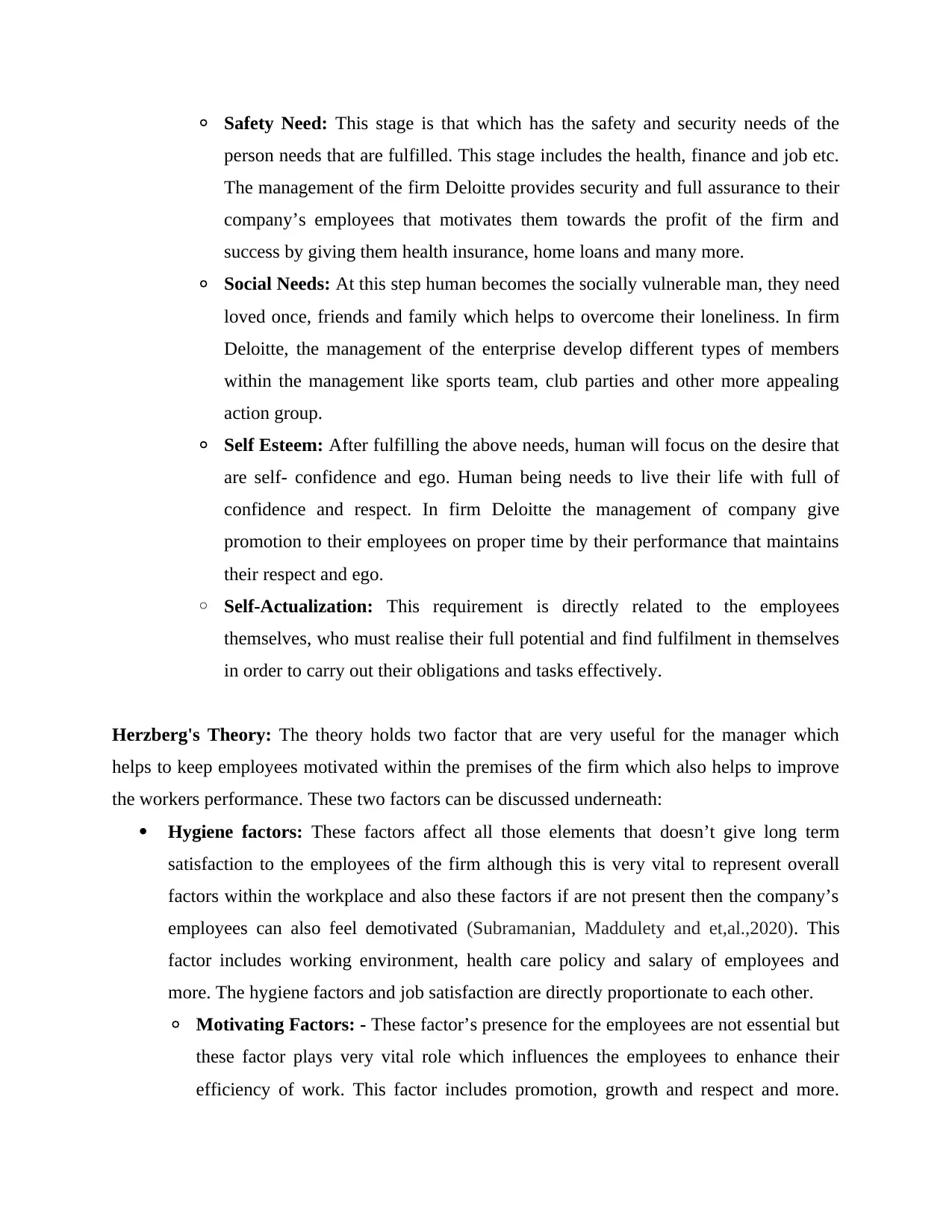
◦ Safety Need: This stage is that which has the safety and security needs of the
person needs that are fulfilled. This stage includes the health, finance and job etc.
The management of the firm Deloitte provides security and full assurance to their
company’s employees that motivates them towards the profit of the firm and
success by giving them health insurance, home loans and many more.
◦ Social Needs: At this step human becomes the socially vulnerable man, they need
loved once, friends and family which helps to overcome their loneliness. In firm
Deloitte, the management of the enterprise develop different types of members
within the management like sports team, club parties and other more appealing
action group.
◦ Self Esteem: After fulfilling the above needs, human will focus on the desire that
are self- confidence and ego. Human being needs to live their life with full of
confidence and respect. In firm Deloitte the management of company give
promotion to their employees on proper time by their performance that maintains
their respect and ego.
◦ Self-Actualization: This requirement is directly related to the employees
themselves, who must realise their full potential and find fulfilment in themselves
in order to carry out their obligations and tasks effectively.
Herzberg's Theory: The theory holds two factor that are very useful for the manager which
helps to keep employees motivated within the premises of the firm which also helps to improve
the workers performance. These two factors can be discussed underneath:
Hygiene factors: These factors affect all those elements that doesn’t give long term
satisfaction to the employees of the firm although this is very vital to represent overall
factors within the workplace and also these factors if are not present then the company’s
employees can also feel demotivated (Subramanian, Maddulety and et,al.,2020). This
factor includes working environment, health care policy and salary of employees and
more. The hygiene factors and job satisfaction are directly proportionate to each other.
◦ Motivating Factors: - These factor’s presence for the employees are not essential but
these factor plays very vital role which influences the employees to enhance their
efficiency of work. This factor includes promotion, growth and respect and more.
person needs that are fulfilled. This stage includes the health, finance and job etc.
The management of the firm Deloitte provides security and full assurance to their
company’s employees that motivates them towards the profit of the firm and
success by giving them health insurance, home loans and many more.
◦ Social Needs: At this step human becomes the socially vulnerable man, they need
loved once, friends and family which helps to overcome their loneliness. In firm
Deloitte, the management of the enterprise develop different types of members
within the management like sports team, club parties and other more appealing
action group.
◦ Self Esteem: After fulfilling the above needs, human will focus on the desire that
are self- confidence and ego. Human being needs to live their life with full of
confidence and respect. In firm Deloitte the management of company give
promotion to their employees on proper time by their performance that maintains
their respect and ego.
◦ Self-Actualization: This requirement is directly related to the employees
themselves, who must realise their full potential and find fulfilment in themselves
in order to carry out their obligations and tasks effectively.
Herzberg's Theory: The theory holds two factor that are very useful for the manager which
helps to keep employees motivated within the premises of the firm which also helps to improve
the workers performance. These two factors can be discussed underneath:
Hygiene factors: These factors affect all those elements that doesn’t give long term
satisfaction to the employees of the firm although this is very vital to represent overall
factors within the workplace and also these factors if are not present then the company’s
employees can also feel demotivated (Subramanian, Maddulety and et,al.,2020). This
factor includes working environment, health care policy and salary of employees and
more. The hygiene factors and job satisfaction are directly proportionate to each other.
◦ Motivating Factors: - These factor’s presence for the employees are not essential but
these factor plays very vital role which influences the employees to enhance their
efficiency of work. This factor includes promotion, growth and respect and more.
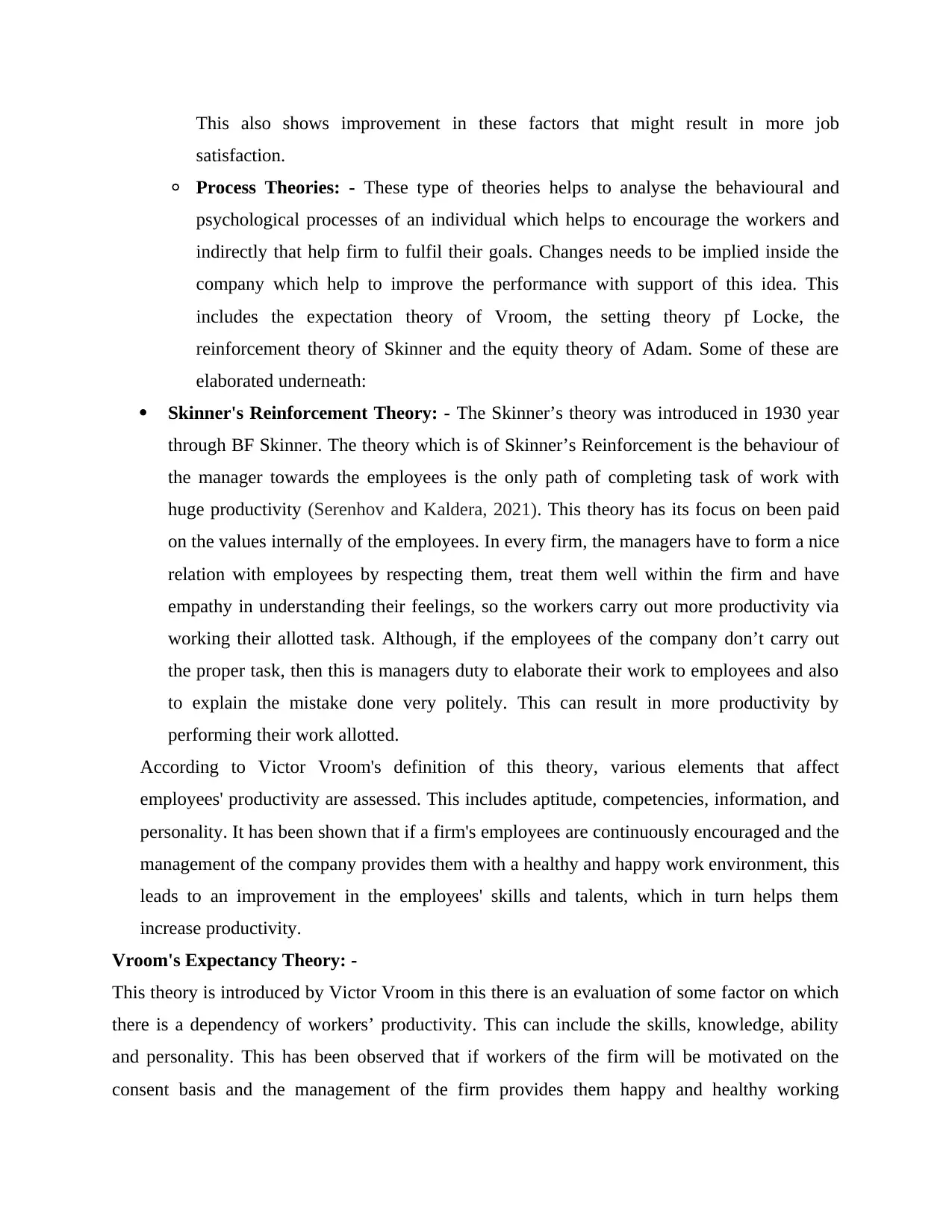
This also shows improvement in these factors that might result in more job
satisfaction.
◦ Process Theories: - These type of theories helps to analyse the behavioural and
psychological processes of an individual which helps to encourage the workers and
indirectly that help firm to fulfil their goals. Changes needs to be implied inside the
company which help to improve the performance with support of this idea. This
includes the expectation theory of Vroom, the setting theory pf Locke, the
reinforcement theory of Skinner and the equity theory of Adam. Some of these are
elaborated underneath:
Skinner's Reinforcement Theory: - The Skinner’s theory was introduced in 1930 year
through BF Skinner. The theory which is of Skinner’s Reinforcement is the behaviour of
the manager towards the employees is the only path of completing task of work with
huge productivity (Serenhov and Kaldera, 2021). This theory has its focus on been paid
on the values internally of the employees. In every firm, the managers have to form a nice
relation with employees by respecting them, treat them well within the firm and have
empathy in understanding their feelings, so the workers carry out more productivity via
working their allotted task. Although, if the employees of the company don’t carry out
the proper task, then this is managers duty to elaborate their work to employees and also
to explain the mistake done very politely. This can result in more productivity by
performing their work allotted.
According to Victor Vroom's definition of this theory, various elements that affect
employees' productivity are assessed. This includes aptitude, competencies, information, and
personality. It has been shown that if a firm's employees are continuously encouraged and the
management of the company provides them with a healthy and happy work environment, this
leads to an improvement in the employees' skills and talents, which in turn helps them
increase productivity.
Vroom's Expectancy Theory: -
This theory is introduced by Victor Vroom in this there is an evaluation of some factor on which
there is a dependency of workers’ productivity. This can include the skills, knowledge, ability
and personality. This has been observed that if workers of the firm will be motivated on the
consent basis and the management of the firm provides them happy and healthy working
satisfaction.
◦ Process Theories: - These type of theories helps to analyse the behavioural and
psychological processes of an individual which helps to encourage the workers and
indirectly that help firm to fulfil their goals. Changes needs to be implied inside the
company which help to improve the performance with support of this idea. This
includes the expectation theory of Vroom, the setting theory pf Locke, the
reinforcement theory of Skinner and the equity theory of Adam. Some of these are
elaborated underneath:
Skinner's Reinforcement Theory: - The Skinner’s theory was introduced in 1930 year
through BF Skinner. The theory which is of Skinner’s Reinforcement is the behaviour of
the manager towards the employees is the only path of completing task of work with
huge productivity (Serenhov and Kaldera, 2021). This theory has its focus on been paid
on the values internally of the employees. In every firm, the managers have to form a nice
relation with employees by respecting them, treat them well within the firm and have
empathy in understanding their feelings, so the workers carry out more productivity via
working their allotted task. Although, if the employees of the company don’t carry out
the proper task, then this is managers duty to elaborate their work to employees and also
to explain the mistake done very politely. This can result in more productivity by
performing their work allotted.
According to Victor Vroom's definition of this theory, various elements that affect
employees' productivity are assessed. This includes aptitude, competencies, information, and
personality. It has been shown that if a firm's employees are continuously encouraged and the
management of the company provides them with a healthy and happy work environment, this
leads to an improvement in the employees' skills and talents, which in turn helps them
increase productivity.
Vroom's Expectancy Theory: -
This theory is introduced by Victor Vroom in this there is an evaluation of some factor on which
there is a dependency of workers’ productivity. This can include the skills, knowledge, ability
and personality. This has been observed that if workers of the firm will be motivated on the
consent basis and the management of the firm provides them happy and healthy working
⊘ This is a preview!⊘
Do you want full access?
Subscribe today to unlock all pages.

Trusted by 1+ million students worldwide
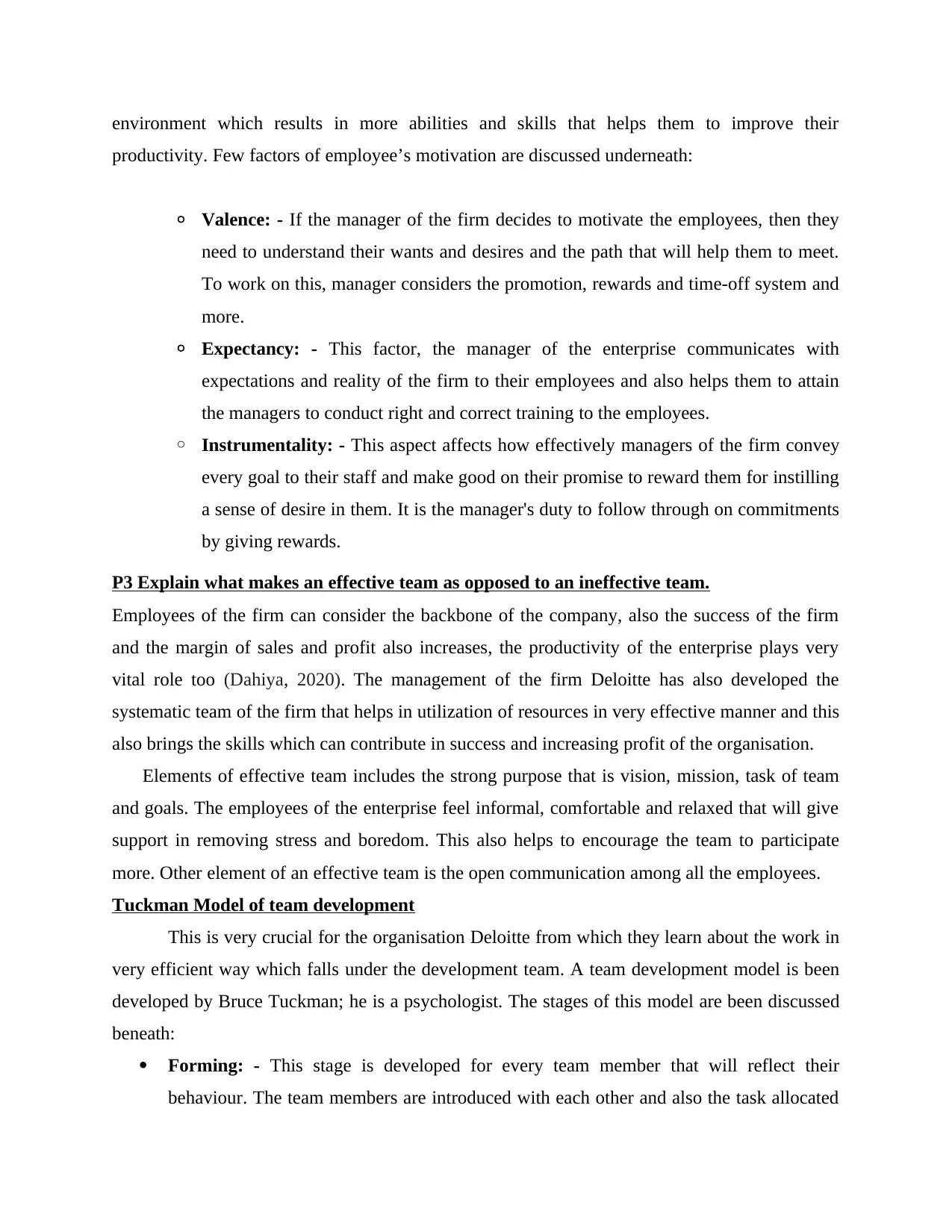
environment which results in more abilities and skills that helps them to improve their
productivity. Few factors of employee’s motivation are discussed underneath:
◦ Valence: - If the manager of the firm decides to motivate the employees, then they
need to understand their wants and desires and the path that will help them to meet.
To work on this, manager considers the promotion, rewards and time-off system and
more.
◦ Expectancy: - This factor, the manager of the enterprise communicates with
expectations and reality of the firm to their employees and also helps them to attain
the managers to conduct right and correct training to the employees.
◦ Instrumentality: - This aspect affects how effectively managers of the firm convey
every goal to their staff and make good on their promise to reward them for instilling
a sense of desire in them. It is the manager's duty to follow through on commitments
by giving rewards.
P3 Explain what makes an effective team as opposed to an ineffective team.
Employees of the firm can consider the backbone of the company, also the success of the firm
and the margin of sales and profit also increases, the productivity of the enterprise plays very
vital role too (Dahiya, 2020). The management of the firm Deloitte has also developed the
systematic team of the firm that helps in utilization of resources in very effective manner and this
also brings the skills which can contribute in success and increasing profit of the organisation.
Elements of effective team includes the strong purpose that is vision, mission, task of team
and goals. The employees of the enterprise feel informal, comfortable and relaxed that will give
support in removing stress and boredom. This also helps to encourage the team to participate
more. Other element of an effective team is the open communication among all the employees.
Tuckman Model of team development
This is very crucial for the organisation Deloitte from which they learn about the work in
very efficient way which falls under the development team. A team development model is been
developed by Bruce Tuckman; he is a psychologist. The stages of this model are been discussed
beneath:
Forming: - This stage is developed for every team member that will reflect their
behaviour. The team members are introduced with each other and also the task allocated
productivity. Few factors of employee’s motivation are discussed underneath:
◦ Valence: - If the manager of the firm decides to motivate the employees, then they
need to understand their wants and desires and the path that will help them to meet.
To work on this, manager considers the promotion, rewards and time-off system and
more.
◦ Expectancy: - This factor, the manager of the enterprise communicates with
expectations and reality of the firm to their employees and also helps them to attain
the managers to conduct right and correct training to the employees.
◦ Instrumentality: - This aspect affects how effectively managers of the firm convey
every goal to their staff and make good on their promise to reward them for instilling
a sense of desire in them. It is the manager's duty to follow through on commitments
by giving rewards.
P3 Explain what makes an effective team as opposed to an ineffective team.
Employees of the firm can consider the backbone of the company, also the success of the firm
and the margin of sales and profit also increases, the productivity of the enterprise plays very
vital role too (Dahiya, 2020). The management of the firm Deloitte has also developed the
systematic team of the firm that helps in utilization of resources in very effective manner and this
also brings the skills which can contribute in success and increasing profit of the organisation.
Elements of effective team includes the strong purpose that is vision, mission, task of team
and goals. The employees of the enterprise feel informal, comfortable and relaxed that will give
support in removing stress and boredom. This also helps to encourage the team to participate
more. Other element of an effective team is the open communication among all the employees.
Tuckman Model of team development
This is very crucial for the organisation Deloitte from which they learn about the work in
very efficient way which falls under the development team. A team development model is been
developed by Bruce Tuckman; he is a psychologist. The stages of this model are been discussed
beneath:
Forming: - This stage is developed for every team member that will reflect their
behaviour. The team members are introduced with each other and also the task allocated
Paraphrase This Document
Need a fresh take? Get an instant paraphrase of this document with our AI Paraphraser
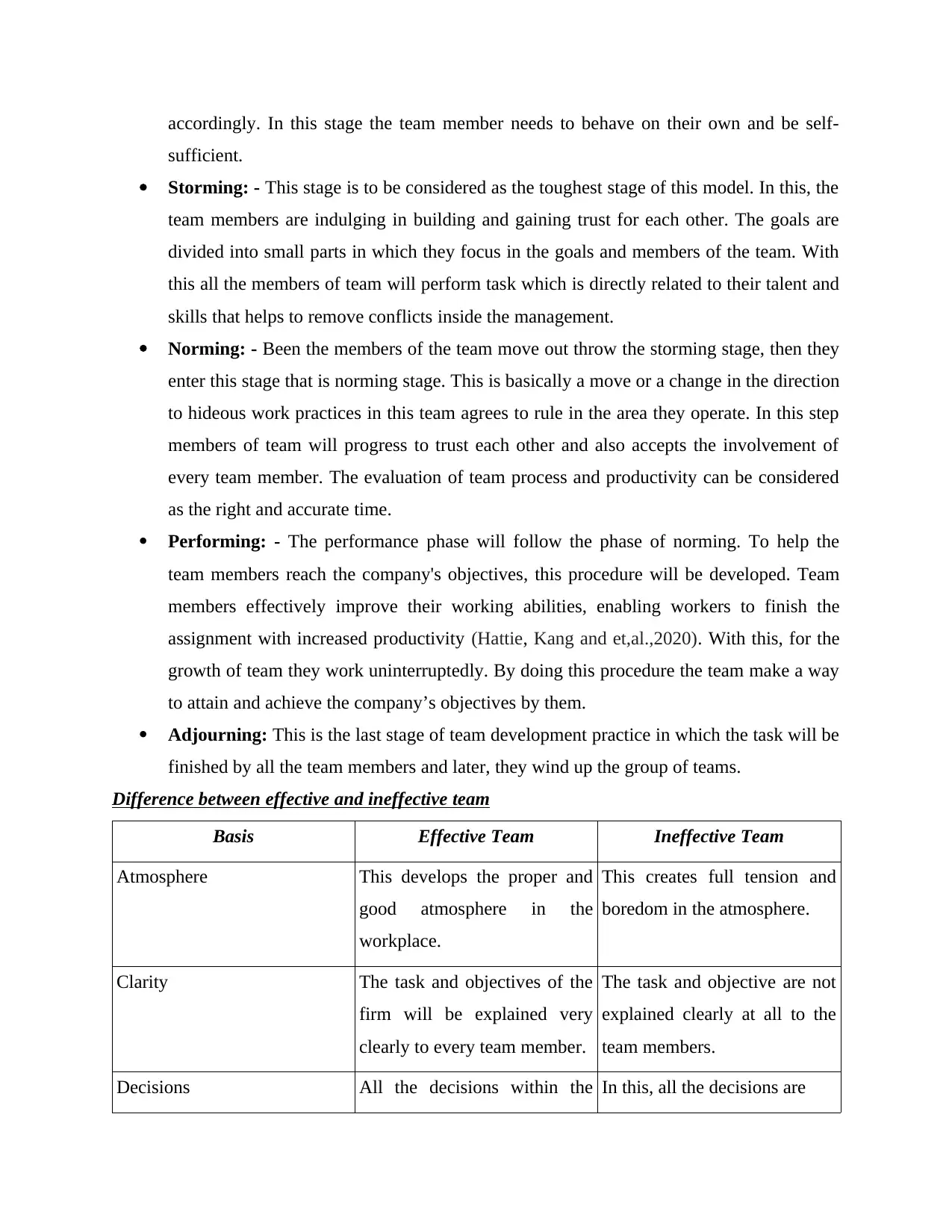
accordingly. In this stage the team member needs to behave on their own and be self-
sufficient.
Storming: - This stage is to be considered as the toughest stage of this model. In this, the
team members are indulging in building and gaining trust for each other. The goals are
divided into small parts in which they focus in the goals and members of the team. With
this all the members of team will perform task which is directly related to their talent and
skills that helps to remove conflicts inside the management.
Norming: - Been the members of the team move out throw the storming stage, then they
enter this stage that is norming stage. This is basically a move or a change in the direction
to hideous work practices in this team agrees to rule in the area they operate. In this step
members of team will progress to trust each other and also accepts the involvement of
every team member. The evaluation of team process and productivity can be considered
as the right and accurate time.
Performing: - The performance phase will follow the phase of norming. To help the
team members reach the company's objectives, this procedure will be developed. Team
members effectively improve their working abilities, enabling workers to finish the
assignment with increased productivity (Hattie, Kang and et,al.,2020). With this, for the
growth of team they work uninterruptedly. By doing this procedure the team make a way
to attain and achieve the company’s objectives by them.
Adjourning: This is the last stage of team development practice in which the task will be
finished by all the team members and later, they wind up the group of teams.
Difference between effective and ineffective team
Basis Effective Team Ineffective Team
Atmosphere This develops the proper and
good atmosphere in the
workplace.
This creates full tension and
boredom in the atmosphere.
Clarity The task and objectives of the
firm will be explained very
clearly to every team member.
The task and objective are not
explained clearly at all to the
team members.
Decisions All the decisions within the In this, all the decisions are
sufficient.
Storming: - This stage is to be considered as the toughest stage of this model. In this, the
team members are indulging in building and gaining trust for each other. The goals are
divided into small parts in which they focus in the goals and members of the team. With
this all the members of team will perform task which is directly related to their talent and
skills that helps to remove conflicts inside the management.
Norming: - Been the members of the team move out throw the storming stage, then they
enter this stage that is norming stage. This is basically a move or a change in the direction
to hideous work practices in this team agrees to rule in the area they operate. In this step
members of team will progress to trust each other and also accepts the involvement of
every team member. The evaluation of team process and productivity can be considered
as the right and accurate time.
Performing: - The performance phase will follow the phase of norming. To help the
team members reach the company's objectives, this procedure will be developed. Team
members effectively improve their working abilities, enabling workers to finish the
assignment with increased productivity (Hattie, Kang and et,al.,2020). With this, for the
growth of team they work uninterruptedly. By doing this procedure the team make a way
to attain and achieve the company’s objectives by them.
Adjourning: This is the last stage of team development practice in which the task will be
finished by all the team members and later, they wind up the group of teams.
Difference between effective and ineffective team
Basis Effective Team Ineffective Team
Atmosphere This develops the proper and
good atmosphere in the
workplace.
This creates full tension and
boredom in the atmosphere.
Clarity The task and objectives of the
firm will be explained very
clearly to every team member.
The task and objective are not
explained clearly at all to the
team members.
Decisions All the decisions within the In this, all the decisions are
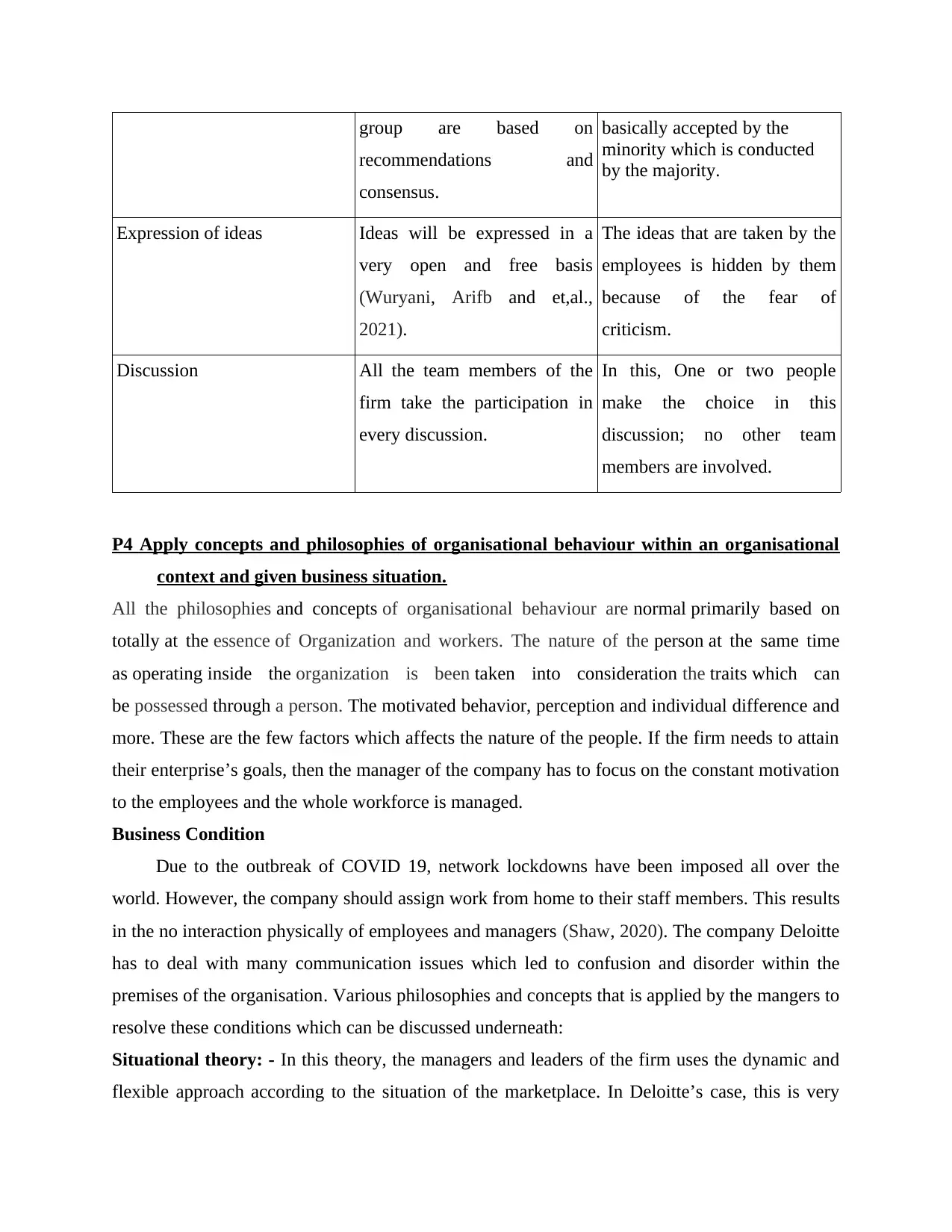
group are based on
recommendations and
consensus.
basically accepted by the
minority which is conducted
by the majority.
Expression of ideas Ideas will be expressed in a
very open and free basis
(Wuryani, Arifb and et,al.,
2021).
The ideas that are taken by the
employees is hidden by them
because of the fear of
criticism.
Discussion All the team members of the
firm take the participation in
every discussion.
In this, One or two people
make the choice in this
discussion; no other team
members are involved.
P4 Apply concepts and philosophies of organisational behaviour within an organisational
context and given business situation.
All the philosophies and concepts of organisational behaviour are normal primarily based on
totally at the essence of Organization and workers. The nature of the person at the same time
as operating inside the organization is been taken into consideration the traits which can
be possessed through a person. The motivated behavior, perception and individual difference and
more. These are the few factors which affects the nature of the people. If the firm needs to attain
their enterprise’s goals, then the manager of the company has to focus on the constant motivation
to the employees and the whole workforce is managed.
Business Condition
Due to the outbreak of COVID 19, network lockdowns have been imposed all over the
world. However, the company should assign work from home to their staff members. This results
in the no interaction physically of employees and managers (Shaw, 2020). The company Deloitte
has to deal with many communication issues which led to confusion and disorder within the
premises of the organisation. Various philosophies and concepts that is applied by the mangers to
resolve these conditions which can be discussed underneath:
Situational theory: - In this theory, the managers and leaders of the firm uses the dynamic and
flexible approach according to the situation of the marketplace. In Deloitte’s case, this is very
recommendations and
consensus.
basically accepted by the
minority which is conducted
by the majority.
Expression of ideas Ideas will be expressed in a
very open and free basis
(Wuryani, Arifb and et,al.,
2021).
The ideas that are taken by the
employees is hidden by them
because of the fear of
criticism.
Discussion All the team members of the
firm take the participation in
every discussion.
In this, One or two people
make the choice in this
discussion; no other team
members are involved.
P4 Apply concepts and philosophies of organisational behaviour within an organisational
context and given business situation.
All the philosophies and concepts of organisational behaviour are normal primarily based on
totally at the essence of Organization and workers. The nature of the person at the same time
as operating inside the organization is been taken into consideration the traits which can
be possessed through a person. The motivated behavior, perception and individual difference and
more. These are the few factors which affects the nature of the people. If the firm needs to attain
their enterprise’s goals, then the manager of the company has to focus on the constant motivation
to the employees and the whole workforce is managed.
Business Condition
Due to the outbreak of COVID 19, network lockdowns have been imposed all over the
world. However, the company should assign work from home to their staff members. This results
in the no interaction physically of employees and managers (Shaw, 2020). The company Deloitte
has to deal with many communication issues which led to confusion and disorder within the
premises of the organisation. Various philosophies and concepts that is applied by the mangers to
resolve these conditions which can be discussed underneath:
Situational theory: - In this theory, the managers and leaders of the firm uses the dynamic and
flexible approach according to the situation of the marketplace. In Deloitte’s case, this is very
⊘ This is a preview!⊘
Do you want full access?
Subscribe today to unlock all pages.

Trusted by 1+ million students worldwide
1 out of 14
Related Documents
Your All-in-One AI-Powered Toolkit for Academic Success.
+13062052269
info@desklib.com
Available 24*7 on WhatsApp / Email
![[object Object]](/_next/static/media/star-bottom.7253800d.svg)
Unlock your academic potential
Copyright © 2020–2026 A2Z Services. All Rights Reserved. Developed and managed by ZUCOL.


